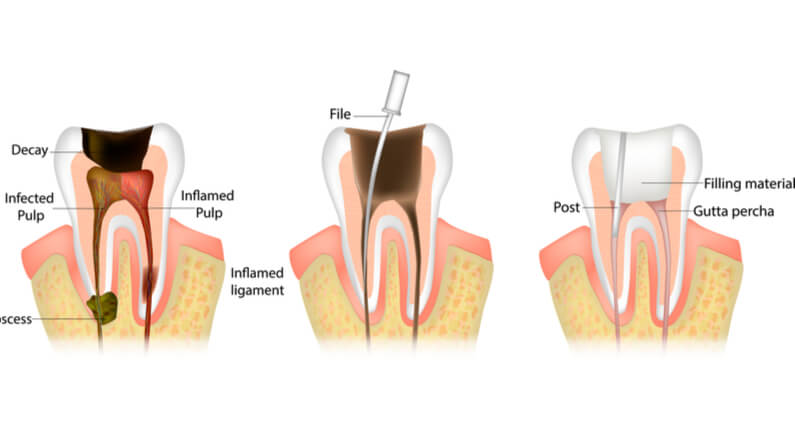Root canals are an important part of oral health, but they’re often misunderstood. Many people believe that a root canal is a painful procedure, but that’s not usually the case.
In this blog post, we’ll discuss what a root canal is, how long it takes to perform what you can expect during and after the procedure, and more. We hope this information helps you feel more confident about your upcoming root canal treatment.
What Is a Root Canal?

It is a dental procedure that involves removing the nerve and soft tissue from the inside of a tooth. This is usually necessary when the tooth has been damaged by decay or injury, and it’s important to remove the damaged tissue to prevent further damage to the tooth.
A root canal procedure is usually performed by a dentist or an endodontist, which is a dentist who specializes in this type of procedure. The procedure itself is usually not painful, but it can be uncomfortable.
What Causes a Root Canal?
This endodontic treatment is usually necessary when:
- The tooth has been damaged by decay: When you have tooth decay, the bacteria in the mouth can enter the tooth and cause an infection. This can lead to pain, swelling, and inflammation.
- The tooth has been injured: If you’ve had an injury to your mouth, it’s possible that the nerve of the tooth has been damaged.
- There is an infection in the tooth: If the tooth is infected, it’s important to remove the infected pulp to prevent the infection from spreading.
What Are Symptoms of Needing a Root Canal

You may need this procedure when you experience the following symptoms:
- A toothache
- Sensitivity to hot or cold temperatures
- Swollen gums
- A small bump on the gums
How Much Does a Root Canal Cost?
The cost of this procedure will vary depending on the severity of the damage to your tooth, as well as the dentist you see. In general, the average cost of this procedure is between $500 and $1,500.
It is best to consult with your dentist to get an estimate of the cost of your specific procedure. Dental insurance coverage should also shoulder at least a portion of the cost of a root canal.
How Should I Prepare for Root Canal Treatment?
Your dentist will give you specific instructions on how to prepare for your root canal, but in general, you should:
- Brush and floss your teeth thoroughly: This will help to remove any bacteria or plaque from your teeth.
- Avoid eating hard or chewy foods: These can cause irritation to your gums.
- Take over-the-counter pain medication: This can help to ease any discomfort you’re feeling.
- Arrange for a ride home: You may be sedated for the procedure, so it’s important to have someone else drive you home.
How Long Does a Root Canal Take?
The procedure usually takes between one and two hours to complete. The length of the procedure will depend on the severity of the damage to your tooth.

What Happens During a Root Canal Process?
During a root canal, your dentist will:
- Make an opening in the tooth: This will allow your dentist to access the inside of the tooth.
- Remove the damaged nerve and soft tissue: This is usually done with a small drill.
- Clean and disinfect the inside of the tooth: This helps to prevent infection.
- Fill the tooth: This is usually done with a rubber-like material called gutta-percha.
- Seal the tooth: This helps to prevent infection.
Does Root Canals Painful?
Root canals are not typically painful. You may experience some discomfort during the procedure, but this can usually be alleviated with local anesthesia. You may also experience some sensitivity in the tooth afterward, but this should go away within a few days.
If you’re experiencing pain after a root canal, it’s important to contact your dentist. This could be a sign of infection.

What Should I Expect After a Root Canal?
After the procedure, you should:
- Avoid chewing on the tooth for 24 hours to prevent irritation.
- Avoid hot or cold foods
- Take over-the-counter pain
- Brush and floss your teeth as usual
It is also important to see your dentist for a follow-up appointment to make sure the infection has been completely removed.
What Are the Risks of a Root Canal?
There are risks associated with any dental procedure, but complications from the procedure are rare. The most common complication is an infection, which can usually be treated with antibacterial medications.
Seek Medical Advice From the Expert
Root canals are a common dental procedure that can save a damaged tooth. If you think you may need a root canal, it’s important to see your dentist for an evaluation.
Your dentist will be able to determine if a root canal is the best option for you and help you to understand what to expect during and after the procedure.
If you’re in Houston, Texas, contact Brownstone Dental. We want to help you feel confident about your upcoming root canal treatment. We’re here to answer any questions you may have and to provide you with all the information you need to make the best decision for your oral health. Contact us today or visit our dental office if you have any questions or would like to schedule an appointment!